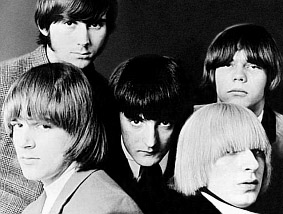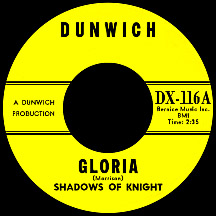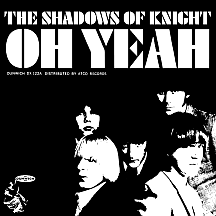SHADOWS OF KNIGHT
Gloria
Roughnecks? Troublemakers? Hooligans!? Why were some of the good citizens of Arlington Heights, Illinois referring to local band The Shadows in this way? Okay, they were prone to pranksterism...and loved to party...and they couldn't resist the hometown girls who made themselves available once they'd gained a reputation in the Northern Chicago suburb. That was how rockers rolled in the mid-'60s (or anytime, really). Many stricken female fans saw them as acceptable stand-ins for The Beatles, just like comparable bands in cities across the U.S., Canada, France, Djibouti, Tuvalu, you name it...nearly every world location save the one seaport town in the U.K. from where the original Fab Four hailed.
Jim Sohns was always the main Shadow, though he didn't necessarily garner the respect a leader should (the others called him a "little hairy wild man," not an altogether innacurate description). Lead guitarist Warren Rogers, founder of a surf combo called the Shadows, joined Sohns when his group broke up, its name the only comparison between the two. Other players they knew while attending Mount Prospect High School were added: rhythm guitarist Norm Gotsch, bassist Wayne Pursell and drummer/motorcycle enthusiast Tom Schiffour. Sometime in 1964, record store owner Paul Sampson spotted the guys performing at a dance and placed them on the bill of a multi-band affair at the Mount Prospect Country Club, attended by practically every pre-teenager-to-twenty-plusser in the area; he then opened an all-ages nightspot, the Cellar, and before long people were buzzing about the Shadows and other regular Cellar acts throughout the Chicago area. Arlington Heights city officials were not enamored of this rock culture invading their "quiet little town" and many parents were in agreement.
As personal appearances became a regular thing, these city officials leaned on the rowdy boys even harder; after they'd allegedly caused some property damage and especially after police charges were filed claiming the guys (all still in their teens) had compromised the innocence of a few local fangirls, the band was banned from performing in or around Arlington Heights. Meanwhile Sampson, aware of the existence of a famous Shadows band far across the Atlantic who'd backed Brit rocker Cliff Richard and scored their own separate run of instrumental singles (a dozen consecutive U.K. top ten hits including five number ones!), insisted on a name change. For a time they called themselves The Thyme, which allowed them to keep doing gigs in the area, at least until local leaders caught on. But it mattered little; Sampson got them on the roster of a series of shows sponsored by Chicago's top-rated music station, WLS.
Two lineup changes occurred in '65: Gotsch got drafted and rhythm axe man Jerry McGeorge replaced him, then Purcell dropped out and Joe Kelley (they called him "the sheepdog" because he combed his long hair over his eyes) came on board as bass player and sometimes-lead guitarist. Chicago promoter Bill Traut, planning to start a record label, was convinced by Sampson to consider the band, who'd reverted to a variation of their previous name; they got the idea from their high school's football team, the Prospect Knights, taking on the mysterious-sounding moniker Shadows of Knight with its Beatlesque trick spelling. Signing with Traut's Dunwich label, the first sessions were held during 1965's Christmas season. In early '66, their first single was released.
They covered Irish band Them's "Gloria," which had been part of their live shows for several months. Sohns' American "garage band" sound contrasted Van Morrison's not-yet-legendary but distinctive vocals on the original. Sampson got a crowd of Cellar regulars together to jam the request lines at WLS, but the ploy may not have been necessary as the song was connecting with fans in Chicago and scores of midwest cities the clear-channel WLS signal reached during nighttime hours. Just as Them's version had broken through in Los Angeles in spring '65, hitting number one there and in other parts of California, the Shadows of Knight reached the top of the WLS survey in March 1966, moving forward into many eastern radio markets and in a smattering of western cities with help from the group's appearances on local TV shows as well as Dick Clark's network-dominant American Bandstand and Where the Action Is. The single got so big that Traut made a distribution deal with Atlantic Records. With competition from Them's original (which was still breaking around the country a year after its release), "Gloria" by Shadows of Knight came out ahead, reaching the top ten on the national charts in May.

The band recorded their first album right before heading out on an extended road trip. The LP contained songs penned by crew members (two good ones: "Dark Side" from the single's flip and "Light Bulb Blues"), in addition to remakes of blues songs by Muddy Waters, Bo Diddley and others. The sophomore single (credited with an added "the" in front of the act's name) was a Diddley song, "Oh Yeah," with increased tempo and amped-up intensity, that landed in the top 40 in July. It was followed by the lower-charting but even more rocking "Bad Little Woman," originated by The Wheels (who had some influence on SOK's Irish counterparts Them). Crunchy-riff "I'm Gonna Make You Mine" slipped into low-chart territory in December. The tour, which kept them on the road for several months, was not without its incidents. Issues the city of Arlington had with them in the early days (like drunken behavior, relieving themselves on various monuments, destroying furniture and soiling the reputations of young women) increased tenfold as they moved from city to city, ranking them right up there with The Rolling Stones, The Who and other hard-partying bands of the era. Or so the stories go.
Late in the year, Rogers resigned (rumors of a preference for male affection led to the departure...or did the other members demand his resignation?) and was replaced by David "Hawk" Wolinski, who didn't stay long (a decade later he turned up as a keyboardist with Rufus and Chaka Khan). Schiffour vacated the drum kit and there was no replacement, just fill-in drummers as needed. Kelley quit and formed The Joe Kelley Blues Band, embarking on a long stint as one of the Windy City's most revered blues guitarists. By the summer of '67 the band had fallen apart, but Sohns was determined to keep it going. He put a new group together (Woody Woodruff on lead guitar, Dan Baughman, rhythm, John Fisher, bass, Kenny Turkin, drums) and signed with Neil Bogart's Buddah label (excising the temporarily tacked-on "the" in the name forever), putting them in a position to be the next big "bubblegum" group under the Jerry Kasenetz-Jeff Katz production team. Fall '68 mid-charter "Shake" pushed the boundaries and is arguably the most rocking of Buddah's bubblegum hits. A couple of 45s followed on Jerry and Jeff's Super K label.
Two singles on Atlantic's Atco imprint include the Traut-produced "Gloria '69," just one of hundreds of pointless attempts by hitmaking acts to regain former glory. When Atco dropped them, it appeared to be the end. But one thing happened in 1972 that gave the group a certain degree of immortality: writer, guitarist and record shop employee Lenny Kaye compiled Nuggets: Original Artyfacts from the First Psychedelic Era for Elektra Records, a two-disc album with 27 favorite garage tracks he categorized as early punk rock (a term not widely in use at the time). All the acts on the set reaped benefits, including SOK ("Oh Yeah" kicked off side two) as the compilation had an enormous effect on the emerging class of rockers from the '70s and '80s, priming the pump for the punks to come. Many have credited its influence.
Jim Sohns kept Shadows of Knight going, in name at least, for the better part of a half-century (you read that right), his vocals a trademark that legitimized each performance, in any town hall, bar or small hotel that would have him, despite the presence of a great many temporary backing musicians. None of the group members who were part of the act between 1964 and 1970 had anything to do with Sohn's dogged efforts to regularly relive his brief career peak, but they had to be impressed by his determination.



